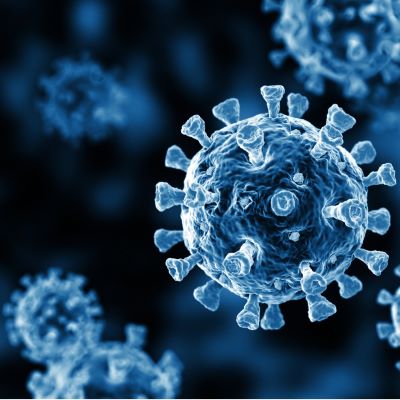Published:
A national biobank for COVID-19 research
€2 million investment in the National Irish COVID-19 Biobank (NICB) will advance high impact research into COVID-19 and inform future biobanking initiatives in other important health areas.
The NICB is an essential new component of Ireland’s response to COVID-19, in which the Health Research Board (HRB) has been playing a key role since the onset of the pandemic in 2020. Supported by the HRB at the request of the Department of Health, the NICB will ensure that COVID-19 samples and associated clinical data are collected in a coordinated and harmonised manner, and that researchers can access this material using a mechanism that complies with safety, quality, and other international best practices and standards. This will allow more opportunity for research and innovation to increase our understanding of COVID-19, inform new treatment and management strategies, improve health outcomes, and better prepare us for future emergencies.
The NICB has dual objectives of integrating future collection of COVID-19 samples/data and making them accessible for research, and maximising the integration of existing collections of COVID-19 samples/data. All samples and associated data within the NICB will be consented for research. It will be overseen by an appropriate Governance Board, and decisions taken on access will be published online to ensure transparency. Crucially, the NICB aims to strike the balance between research with the potential to improve the health of many, while protecting the rights, dignity and agency of individual research participants, as well as building and maintaining public trust.
Welcoming the announcement, Minister for Health Stephen Donnelly TD said:
“The Government’s Resilience and Recovery 2020-2021 Plan for Living with COVID-19 firmly acknowledges that coordinated research and innovation, both nationally and internationally, is critical to the response to the COVID-19 pandemic and future threats. Indeed, it specifically highlights the need for ‘infrastructure to support biorepository studies’, as this is key for research that translates into better patient care and outcomes, as well as population health strategies.”
The NICB is exactly this kind of infrastructure, and I welcome it as another world-class example of Irish researchers and clinicians collaborating so that research plays an even stronger role in the fight against COVID-19. Notably, the NICB provides an opportunity to prospectively investigate issues such as emerging variants and the increasing prevalence of long COVID. I am also very pleased by plans for significant public and patient involvement in its work - this is critical for maintaining public trust and ensuring continued participation and support for research in Ireland, and chimes perfectly with the increasing public sentiment of ‘nothing about us without us’.”
Director of Research Strategy and Funding at the HRB, Dr Teresa Maguire, said:
“This is a significant milestone, not just in response to COVID-19, but as the first government investment in biobanking, which should unlock vast research and innovation potential. This investment is embedded in existing national health research infrastructure, is integrated into the healthcare system, and is guided by principles of transparency, inclusiveness and accessibility. It will act as a key driver of national, all-island and international collaboration. Furthermore, progress and learning from the NICB model will inform future public investment in biobanking in other important health areas beyond COVID-19.”
The NICB team involves a collaboration across six academic institutions* and 13 hospitals**, spanning adult, paediatric, maternity and community clinical services. It will be maintained by University College Dublin (UCD) and Trinity College Dublin (TCD) on behalf of a national consortium of partners***, and led by joint Principal Investigators Professor Colm Bergin (Consultant Physician in Infectious Diseases at St James's Hospital) and Professor Paddy Mallon (Consultant Physician in Infectious Diseases at St. Vincent’s University Hospital).
Welcoming the news, Professor Bergin said:
“The announcement of funding of the NICB is very welcome and comes at a vital time in the pandemic. It brings together clinicians, researchers, academics and scientists from all national universities, the affiliated hospitals and Children’s Health Ireland, and will position Ireland to contribute internationally in the fight against COVID, facilitating collaborations with international research consortia.”
Professor Mallon said:
“Establishment of the NICB represents further excellence in Ireland’s response to COVID-19. A rich biorepository of accessible biological samples and clinical data that is collected and maintained in line with the highest scientific standards and maintenance of privacy protection, the NICB will allow better understanding and management of COVID-19 and its complications. It will also help guide future biobanking initiatives into other diseases affecting people in Ireland.”
The NICB is the latest addition to HRB-supported research infrastructure, and the first investment in a national collaborative biobanking effort. HRB investments in research infrastructure (over €150 million in clinical trials infrastructures since 2010) have the overall aim of facilitating high quality, world-leading research to benefit patients, the health system, society and the economy.
Read the Department of Health press release on the NICB
Read about the Health Research Board’s role facilitating access to COVID-19 data for research
Read more about the Health Research Board’s Response to the fight against COVID-19
NOTES:
*Academic institutions
University College Dublin, Trinity College Dublin, Royal College of Surgeons in Ireland, University College Cork, National University of Ireland Galway and University of Limerick.
** Hospitals
Mater Misericordiae University Hospital, National Maternity Hospital Holles Street, St Vincent's University Hospital, Wexford General Hospital, Coombe Women's University Hospital, St James' Hospital, Tallaght University Hospital, Beaumont Hospital, Cork University Hospital, Galway University Hospital, Sligo University Hospital, University Hospital Limerick, and Children's Health Ireland.
***Partners
Queens University Belfast, Royal College of Physicians in Ireland, Irish Platform for Patient Organisations (IPPOSI), and participation by the Health Service Executive (HSE) and HPSC on governance groups.

